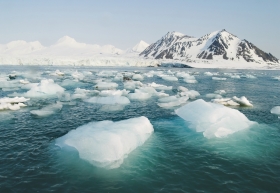Arctic Ocean Rapidly Acidifying

After three years of ongoing research by an international team of scientists, a study commissioned by the Arctic Monitoring and Assessment Programme for a first-ever comprehensive assessment of Arctic Ocean acidification was presented last week at a meeting of Arctic Council Ministers in Bergen, Norway.
The research show that the cold waters of the Arctic sea are more vulnerable to acidification. Cold water more readily absorbs CO2 and combined with the precipitous drop in summer sea ice extent, thus exposing more open water, northern oceans are rapidly acidifying.
"The sea ice has been a lid on the Arctic, so the loss of ice is allowing fast uptake of CO2," said Richard Bellerby of the Norwegian Institute for Water Research, chairman of the report.
Ocean waters in the north are made even more vulnerable to acidification by increased freshwater flows from rivers and melting land ice. Freshwater is less able to neutralize the acidifying effects of CO2, Bellerby explains.
"Large rivers flow into the Arctic, which has an enormous catchment for its size," he said. "There's slow mixing so in effect we get a sort of freshwater lens on the top of the sea in some places, and freshwater lowers the concentration of ions that buffers pH change."
Even given the fantasy of immediate and aggressive efforts to
mitigate carbon emissions, increased ocean acidification in the Arctic
(and globally) is already baked into the climatic system
"We have already passed critical thresholds. Even if we stop emissions
now, acidification will last tens of thousands of years. It is a very
big experiment," says Bellerby.
Other conclusions of the study show probable impacts on ecosystems and habitats throughout the Arctic from ocean acidification — among these findings:
- Due to the relatively simple food webs found in the Arctic,
ecosystems are more vulnerable to changes when key species are impacted
by external factors (such as acidification)
- Ocean acidification is likely to directly or indirectly affect Arctic
marine organisms throughout the food chain, from plankton to fish
- What impacts marine organisms impacts humans as well. Arctic ocean
acidification will have potentially adverse effects on commercial
fisheries and marine resources used and relied upon by indigenous people
See more at Global Warming is Real.
Read the abstract at Arctic Ocean Acidification.
Arctic Ocean image via Shutterstock.
©2013. Copyright Environmental News Network To subscribe or visit go to: http://www.enn.com